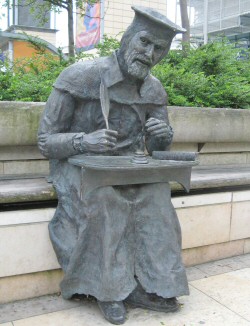Forbidden to work in England, Tyndale translated and printed in English the New Testament and half the Old Testament between 1525 and 1535 in Germany and the Low Countries. He worked from the Greek and Hebrew original texts when knowledge of those languages in England was rare. His pocket-sized Bible translations were smuggled into England, and then ruthlessly sought out by the Church, confiscated and destroyed. Condemned as a heretic, Tyndale was strangled and burned outside Brussels in 1536.
Tyndale's English translation of the New Testament was taken almost word for word into the much praised Authorised Version (King James Bible) of 1611, which also reproduces a great deal of his Old Testament. From there his words passed into our common understanding.
People across the world honour him as a great Englishman. His solitary courage, and his skill with languages - including, supremely, his own - enriched English history and then reached out to affect all English-speaking nations.
His influence has been as wide as Shakespeare's. His phrases are so well-known that they are often thought to be proverbial - 'let there be light', 'we live and move and have our being', 'fight the good fight', 'the signs of the times', 'the powers that be', 'a law unto themselves', and hundreds more. The familiar words telling the great Bible stories are usually Tyndale's.
Elsewhere on this website you will find more information about his life and his works, together with some recommended Resources for further study.
 Photo: Statue of William Tyndale
Photo: Statue of William Tyndale